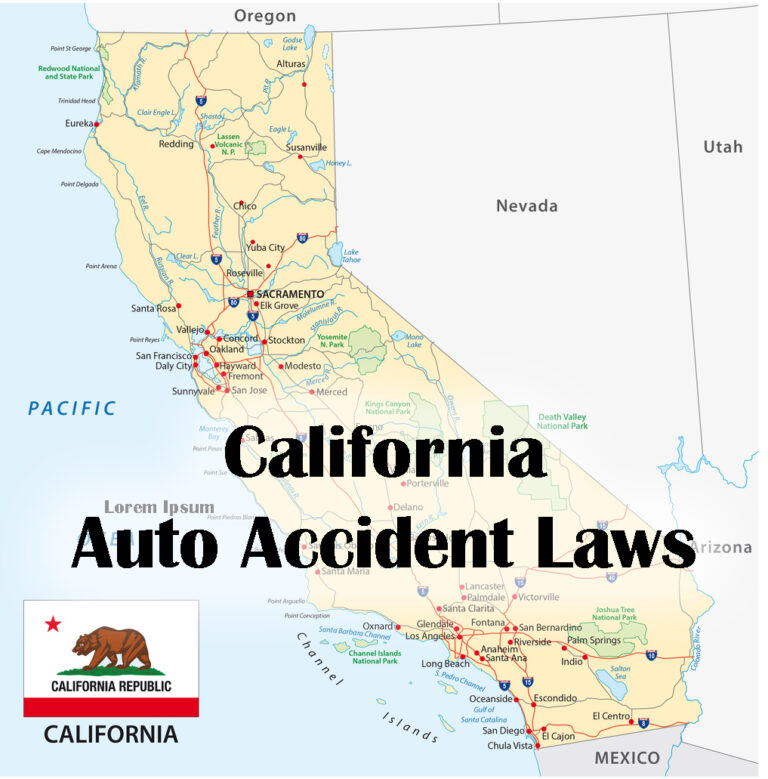Car Accident State Laws in California plus FAQ’s
Car Accident Laws in California
Car accidents can inflict serious and even life-changing injuries. If you’ve had a car accident in California, you might just be entitled to some kind of monetary compensation. California’s car accident laws can be different from the ones you might be familiar with. They can also impact legal claims that you might decide to file. This is why it’s important to understand your obligations as a driver, how to determine fault, and what can potentially affect your ability to obtain compensation.
Once you’ve concluded that you want to get compensation by filing a lawsuit, it’s ideal to hire an auto accident attorney that has the necessary experience in navigating the complex laws of California and all of its procedures.
Here’s what you need to know about the car accident laws in California:
Every single driver in California has to provide a reasonable amount of care to avoid injuring others. Drivers must also obey all traffic laws, pay attention to the road conditions, and drive safely and responsibly.
In the event of an auto accident in California, all drivers involved are required to stop and check to see if there has been anyone injured. If someone has been either injured or killed, it’s the law for drivers to stop at the scene, exchange information, and give assistance, if possible, to anyone who has been injured. The accident should also be reported to California Highway Patrol or the local police department within 24 hours.
Minimal Insurance Requirements
Under California state laws, it is required that vehicle owners be financially responsible for all accidents that they’re involved in. It is required that all vehicles are covered with the minimum 15/30/5 insurance, which means they have the maximum coverage:
- $15,000 in regards to the injury or death of one person
- $30,000 in regards to the injury or death of more than one person
- $5,000 in regards to property damage
Drivers must have proof of insurance available in case they’re involved in an auto accident. They must show the proof when they’re involved in an auto accident, when law enforcement officers ask to see it, or when renewing or initially obtaining vehicle registration. If one fails to provide such proof, it can result in the issuance of fines or the loss of driving privileges.
What’s Required for Reporting Accidents
California car accident laws state that if you’re involved in an accident in the state that results in property damage exceeding $1,000 or any personal injury, you have to legally report the crash. All accidents must be reported to the Department of Motor Vehicles (DMV) by you, your insurance company, or your attorney within 10 days.
Statute of Limitations in California
Every state has its own Statute of Limitations. For California, the law limits the amount of time a car accident victim has to file their legal claim for damages. The time that is allowed will depend on the type of damage that was suffered in the accident.
- Property Damage: Victims who have suffered property damage have 3 years from the accident date to file their claim.
- Bodily Injury: Victims that have suffered bodily injury have 2 years from the date of the auto accident to file their claims.
Auto Accident Liability Laws
The following include car accident laws in California regarding liability:
Comparative Fault: Comparative fault is a law that allows any injured person in an accident to recover compensation as long as they are not entirely responsible for the crash that caused the injuries. This helps ensure that the victims can recover at least part of the damages they sustained in the accident. The theory of pure comparative fault is something that California sticks to. The principles of this theory mean:
- More than one person can be held financially responsible for any harm caused by the accident.
- Victims aren’t prohibited from recovering compensation if they contributed to the accident.
Apportionment of Fault: This is when more than one person ends up being responsible for the accident. Each person will be held financially responsible to a degree of their own fault. If the victim from the accident contributes to their own accident or injury, their ability to recover some kind of compensation will be reduced.
Damages Involving Auto Accidents in California
In terms of car accident laws in California, personal injury victims obtain the right to recover the damages that they’ve suffered due to the negligence of others. California and other states tend to divide the damages into different categories. Economic damages include losses that are connected to a certain economic loss, such as vehicle repair, medical expenses, lost income, burial expenses, and more, while non-economic damages are those that aren’t easy to compute, such as pain and suffering, disability, emotional distress, mental anguish, etc.
Find An Auto Accident Attorney In Your Area
Auto Accident FAQ

